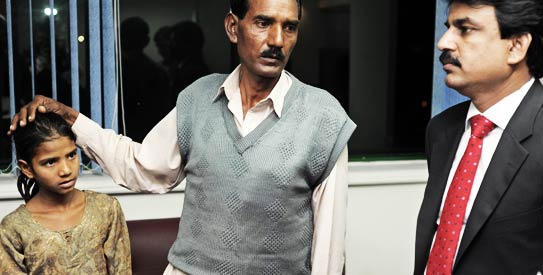
ISLAMABAD: A Pakistani Christian family whose mother has been sentenced to death for insulting Islam has gone into hiding because of death threats, they said Wednesday.
Politicians and conservative clerics are at loggerheads on whether President Asif Ali Zardari should pardon Aasia Bibi, a mother of five sentenced to hang for defaming Prophet Muhammed under controversial blasphemy laws.
Pakistan's minister for minority affairs, Shahbaz Bhatti, who is himself a Christian, told reporters that Aasia's family had been forced to flee their home but declined to say where they were staying because of security fears.
Aasia's husband, Ashiq Masih, who works in a brick factory in the Shekhupura district near Lahore, said he and his children aged nine to 20 had left home because of death threats, but declined to say where they were now living.
“We are frightened. We are receiving threats, especially from clerics. They started demonstrations in the area,” he told reporters in Bhatti's Islamabad office, accompanied by daughters Eesham, nine, and Sidra, 18.
“Yesterday there was a protest in Shekhupura. They said they will not leave Aasia Bibi alive if she is pardoned.” Rights activists say Pakistan's blasphemy law, under which the offence is punishable by death, encourages extremism in a conservative Muslim country on the front line of the US-led war on Al-Qaeda.
Masih said the case was baseless and that the family were “not mad to insult any Prophet, religion or the Quran”, telling how his children broke down in tears when they found out about their mother's plight.
Bhatti said he would submit a petition from the family asking Prime Minister Yousuf Raza Gilani to pardon Aasia.
“Today they have given me a mercy petition for the prime minister. I will submit it to the prime minister this week. The case is baseless,” said Bhatti.
The governor of Punjab, Salman Taseer, has also said he will pass on a petition for clemency to the Pakistani president.
Pope Benedict XVI last week called for Bibi's release and said Christians in Pakistan were “often victims of violence and discrimination.” Aasia has filed a separate appeal against the verdict, but no date has been set for a court hearing.
The case began in June 2009 when she was asked to fetch water while working in the fields. Muslim women labourers objected, saying that as a non-Muslim, she should not touch the water bowl.
Bibi was later mobbed by crowds, arrested and prosecuted after Muslim women complained that she made derogatory remarks about Prophet Muhammed.
Only around three per cent of Pakistan's population of 167 million are estimated to be non-Muslim.












































Dear visitor, the comments section is undergoing an overhaul and will return soon.